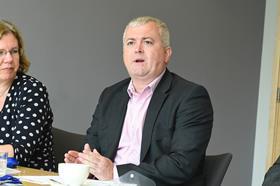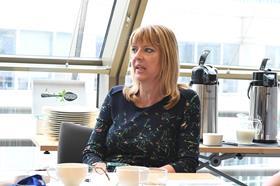‘It’s not seen as glamorous,’ Farrer & Co partner Laura Conduit admits as she reflects on the standing of solicitors who do residential conveyancing. ‘I don’t know why, because I love my job. I don’t really understand why somebody would think that dealing with divorce and misery all day would be more glamorous than dealing with giving people the keys to their next amazing house!
‘Having said that,’ she adds – to the general agreement of other solicitors present at the Gazette’s latest roundtable – ‘I fell into it, and I suspect if we went round the table, not everyone here would say, “Oh, yes, aged 16 I definitely wanted to be [a residential conveyancer]”.’
Most attendees report a market that has endured a volatile year, but in which business is currently holding up well. Press reports of a sharp slowdown in transactions do not tell the whole story, clearly. It is a mixed picture.
Philip Giles, principal of Essex firm Giles Wilson, says: ‘It’s very, very strong at the moment. Just about every conveyancer we come across in our locality is flat out – in fact, [they] have got too much work on. Prices are still going up. There’s talk of the market slowing, but actually we haven’t seen evidence of that yet.’
That includes a healthy pipeline of potential work: ‘[Looking at] the number of enquiries we get each month, it’s as strong as it was a few months ago, including through the summer.’
‘Our market fell off a cliff immediately after Brexit,’ Caroline Sherry, partner at south-east London firm Glazer Delmar, recalls. ‘It went down by over 50% both in quotes given and completions, because so many people withdrew from transactions. Then, through the winter, it was up and down like a rollercoaster… now, we’ve had our strongest August for years.’
There’s a real expectation that price, not just from the legal fees perspective but also the disbursements of the searches, is driving their view on what type of searches they would want in their transaction
Kevin Brown, DWSN
She adds: ‘What I’m finding is that a lot of lenders are being uber-cautious – and that’s what’s causing transactions to fall apart at the moment. It’s the fact that people just can’t get a mortgage offer.’
But if the market has lost some of its post-Brexit volatility, individual transactions have not. Rebecca Swain, partner at Kent firm Thomson Snell & Passmore, notes: ‘Our experience in terms of numbers is that they’re broadly the same as they were this time last year. But I think if you asked our team, “Are you busier this year than last year?” they would say they were busier, because it’s taking so much longer for transactions to get over the line. [There’s] more chasing, more questions, more enquiries. Its not necessarily the legal work, it’s the project management of the transaction.’

‘Every transaction is difficult somehow,’ Seddons’ managing partner Simon Ross continues. ‘The buyers are more cautious and they’re not prepared to take the risks that they were prepared to take in a sellers’ market.’
One sign of that change, he notes, is that buyers now more often want identified problems fixed, and are less satisfied with indemnity policies as a solution.
Substantial increases in 2016 in stamp duty payable on higher value and ‘additional properties’ such as buy-to-let also had an impact on transactions – not least because of ambiguous drafting by the Treasury.
Owen Davies of Severn Trent Searches is a director of the Drainage and Water Searches Network (DWSN), which sponsored this roundtable. He confirms that changes in the market tracked the introduction of new SDLT rates.
‘That’s what we’ve found in the Midlands market,’ he says. ‘We see all the transactions from the vast majority of firms [and] stamp duty had an incredible effect. The February before it finished up to the end of March was just crazy – the busiest February we’ve ever had. Then… [activity went] off a cliff in April.’ The impact, and the timing, were such, says Davies, that it was difficult to discern ‘what were still the after-effects of the stamp duty [change] and what was the start of a confidence-low based on the Brexit [vote]’.
Another contemporary feature of the property market, the ‘Help to Buy’ scheme, is seen to add to the work and cost of transactions. Edward Chuck of central London firm Monro Wright & Wasbrough, explains: ‘They’re just dreadful. You’ve not only got to liaise with the other side but you’ve also got to liaise with the Help to Buy agent. Exactly what the timescales are is not well known because the number of transactions is increasing over time, and so people aren’t quite sure where they are in relation to a transaction – or what they need to do at a certain time. Sometimes the documentation that’s in place for contracts isn’t correct and needs to be amended.’
Downward pressures
Accurate pricing, admittedly difficult to explain to clients, would mean higher fees being charged for a property bought with Help to Buy. Sole practitioner Sarah Dwight notes the same pricing dilemma applies to leasehold properties.
In fact, pricing has reacted to strong downward pressures across much of the residential conveyancing market. Robert Barham, partner at London firm Pemberton Greenish, says: ‘I’m always amazed when you look at a file when you’re selling property [you sold before]. You get the file out from 10 years ago. You look at what you charged, and the value was probably half what it is now. [Yet] you probably charged about the same as you’re quoting now – [despite] all the… [increased] complexity and the delay.’
A lot of lenders are being uber-cautious – and that’s what’s causing transactions to fall apart at the moment. It’s the fact that people just can’t get a mortgage offer
Caroline Sherry, Glazer Delmar

Potential clients calling around, Ross notes, ‘are not going to say, “What service levels are you going to quote?”.’ The only comparator is price. ‘If it’s a £1m transaction, there are still firms outside London that are charging a few hundred pounds. It’s amazing – [clients] will invest such a lot of money in buying a property, yet when it comes to the legal fees, they will not. The managing agent’s fees, they won’t balk at those… [nor] the broker [who] gets them a mortgage.’
Dwight, whose practice is based in Birmingham, urges her peers not to be resigned on this point though. ‘If you have that rapport with a client, if you can pitch it just right – if they then ring round and they don’t get that with somebody else, and it’s £50, £100 difference, you might well get them. That’s because they will think, “That person was transparent. I felt relaxed talking to them.” That’s what they want and they will have heard how stressful moving house can be. Do they want somebody to hold their hand or do they want to do it on price?’
Giles observes: ‘I think it depends where the lead comes from. If it’s a cold lead, then you’ve got to work really hard and really fast to sell the service.’
Complicating the picture here are referral arrangements. Those between volume conveyancers (often regulated as licensed conveyancers, not firms of solicitors) and ‘corporate’ estate agents are cited. ‘As an “industry”,’ Conduit says, ‘I think we should put some pressure on a review of referral fees because [although] they’re disclosed somewhere in the small print of the terms of engagement, I don’t think any client ever reads that. I don’t think that’s enough. I think it should be made very, very clear a referral fee is being paid.
‘Ideally, I don’t think they should be paid. The market should be freed up to be fairer and to make referrals or suggestions of who people should go to based on the right fit for the client.’
At stake are serious ethical issues, Sherry says: ‘I was talking to a solicitor yesterday who’s on the panel for quite a big corporate estate agency. She said she’s not making enough money out of these things, but is also being asked more and more to do things that she feels very uncomfortable in doing as a solicitor giving independent advice to the client. The estate agents are asking her to withhold information, and she said the number of times she’s having to say no [to such requests] these days is increasing.’
There are, Conduit argues, risks attached to the prevalence of fixed fees: ‘A solicitor, when they get to the limit of what they know they are going to be paid for through their fixed fee, is going to be much less cheerful, much less cooperative, and much less helpful to their client, the solicitor that they’re dealing with [and] the agents. It’s why you’ll find some solicitors just won’t take phone calls from estate agents, because they’ve got so much pressure on their fees they haven’t got the time within their fee limit to deal with that part of managing the overall transaction.’
She adds: ‘We very rarely work in that way and that’s one of the reasons why.’
For most, though, fixed fees are a fact. As Giles puts it: ‘Where we are at is fixed fees. There’s no time recording and there’s no point in time recording because by the time you’ve recorded six estate agents phoning you on the same matter in the space of an hour, you know your fees are through the roof. So, it is an incredibly pressurised situation. You would very easily price yourself out of the market if you increased your fee or said, “It’ll be a fixed fee up to this point and then we’ll review it”.’
Foreign investment
The discussion turns to a controversial feature of the residential property market – foreign investment. Here, the uncertainty created by the prospect of Brexit and the relative bargains created by a devalued pound exert conflicting pressures. Still, Conduit notes: ‘The inward investment still seems to be coming.’ Investors deciding they wish to withdraw from ‘something they bought off plan two years ago’ are finding other foreign parties to sell on to, though the original buyer can take ‘a slight hit’.
‘People are still buying,’ Barham notes. ‘We’ve got two developments coming up for completion in the next two months. Average price is about £8m-£10m. There are about 70 in one and 40 in another. So it will be very interesting to see… I think they will all complete.’
We see all the transactions from the vast majority of firms [and] stamp duty had an incredible effect. The February before it finished up to the end of March was the busiest February we’ve ever had. Then… [activity went] off a cliff in April’
Owen Davies, DWSN
For such clients, Ross notes, ‘compliance and tax advice are crucial elements of the central London market’. This makes the related fees for such transactions less price-sensitive, ‘because you can’t start giving a fixed fee on matters such as that, and the savings can be so colossal’.
In that market, ‘the volume may be down,’ he adds, but these transactions are still an important feature. ‘But you’ve got to get past compliance,’ he cautions. ‘How long are you going to take negotiating with your own internal compliance department? Nobody can afford to take a risk these days, and it is so difficult to get verification on some of these things.’
He alludes to examples, such as an owner of a Saudi palace, where the compound did not feature on a standard postal map; and, more commonly, people buying through companies based in Hong Kong, China and Singapore. Anti-money laundering regulations are a demanding part of the legal ‘architecture’ here.

Solicitors find their advice subject to scrutiny on another front, Dwight notes: ‘What we’re finding is that lots of clients who just buy “standard” houses are now being contacted by companies trying to see if they can reclaim stamp duty.’
Conduit continues: ‘[These] companies are trawling the internet looking for the floor plans of properties which have recently been sold. They’re getting the Land Registry data, matching that up with the floor plan on Zoopla or whatever, and then they are saying, “Do you think that there’s an annex there? Do you think somebody thought about multiple dwellings relief?” [Or]: “Oh, there’s an office in this or a field… Did anybody think whether this could come within the commercial stamp duty land tax rate?”.’
‘One of the problems,’ Barham adds, ‘is that stamp duty has gone from essentially a very simple tax to a very complicated tax.’
Residential conveyancing transactions are widely known to be vulnerable to fraud and various types of cybercrime. And recently there have been high-profile examples of law firms falling prey to ‘ransomware’ – DLA Piper being the best known. But when it comes to such ‘cyber-dependent’ crime – the hypothetical example of a firm being hacked by North Korean agents – those present are not too concerned. As Ross puts it: ‘You hope that your IT department could deal with that one.’
Of greater concern are ‘cyber-enabled’ frauds – phishing emails, for example. Sherry outlines her own law firm’s approach: ‘A [security] firm [we work with] sends random phishing emails to us. We had training videos that we all had to watch, which were quite excruciating. But then, every month, we have random phishing emails sent out and I then get a report on who has clicked through.’ That enables her to identify where the weak links in the firm’s security lie among partners and staff.
There is understandable irritation expressed by one attendee at the colleague who endangered the firm’s security by clicking on an offer, in a dubious email, of a free glass of wine. More subtle, Swain says, is an email with the subject ‘new enquiry’. Another hard-to-detect incident reported is where email correspondence with a client had been intercepted, and incorrect bank details inserted as a pdf file within the email.

As a result, Conduit says: ‘In every transaction we make, a phone call is made to verify the bank details, without fail. When that first started happening, [people] were a bit grumpy about receiving the phone call. Now, everybody is very kind to each other and understands that it’s a necessary evil as part of what we’ve all got to do day-to-day… Sometimes we resort to old-fashioned fax.’
For firms with CQS (Conveyancing Quality Scheme) accreditation, enquiries on such matters as ownership are guided by the CQS protocol, which may be reviewed next year. Has the protocol helped transactions run smoothly and to a good standard? The effect has largely been positive, those present agree. But it has its challenges. Dwight, who sits on the CQS technical committee, notes: ‘It’s quite difficult because it’s self-policing. We are dependent on shopping our counterparts, and who wants to do that and create a bad feeling? You are going to come across that person again.’
Conduit adds: ‘The danger is that it is being used as a sort of shield [by] people not wanting to deal with certain enquiries when they are perfectly appropriate enquiries.’ Such incidences are a misuse of the protocol, Dwight suggests: ‘You can raise any enquiry with your client’s authority.’
There is, though, praise for CQS online training – accreditation is partially dependent on passing the training’s related tests. ‘That side of the CQS is really impressive,’ Sherry says. ‘We are all being trained to that higher standard.’
Looking around
The many searches conducted for property transactions are next on our agenda. One problem here, for solicitors, is client expectation that their lawyer can control everything, from the veracity and completeness of searches to their format and timely arrival. This is the challenge of ‘information that comes from external sources’, Dwight notes. ‘I always try and explain to my clients that a conveyancer’s job is putting together a jigsaw puzzle, because everything comes from different places and we have no control over the speed that that comes to us. We then have to put it all together and make sure it fixes.
‘The public perception,’ she observes, ‘is that conveyancers are the ones who slow everything down, whereas actually it’s all these other things – mortgage offers, searches [etc].’
Searches are also driven by local market norms and drawing information from disparate sources, bringing the added challenge of producing information in different formats.
DWSN chair Kevin Brown notes that in some regions, ‘there’s a real expectation that price, not just from the legal fees perspective but also the disbursements of the searches, is actually driving their view on what type of searches they would want in their transaction.
‘It’s not necessarily just about house price,’ he adds.
Brown and Davies are working with the Law Society to shape the drainage and water search standard CON29DW. The driver here, Brown notes, is towards a clear common standard of information and format. ‘The challenge that we tend to have,’ he notes, ‘is first of all making sure that you get a consistent product nationally.’
This will require ‘eight or nine different organisations’ to synthesise and organise access to information. Also in prospect are more satisfactory searches for new-build developments.
In summary, Barham reminds his peers of the improvements that have occurred in searches. ‘I have been doing conveyancing for 29 years and one of the big changes has been how efficient searches are now,’ he says. ‘Let’s not forget that it is a brilliant service we get compared to 20 years ago when, literally, you were writing out forms using carbon paper… It took ages to do searches. You can request a sweep of searches in five minutes now, from the providers. Many [searches] are back within 24 hours. It’s pretty good. We don’t have a lot of complaints about searches. It’s normally mortgage companies or something else that is delaying things.’
New recruits
As noted at the outset, residential conveyancing practices can struggle to appeal to new recruits. The impact of that is serious on several levels. A shortage of good lawyers means the workload increases correspondingly for existing practitioners. That in turn puts pressure on the high standards of professionalism all solicitors are committed to maintaining – and of course it impacts on the pace and smooth execution of transactions.

What is the response of those present? The first is to be more openly positive about the nature of the job. Dwight stresses the demanding interpersonal skills needed – which are also a source of clear satisfaction for her: ‘It’s all to do with people’s personalities. I think one of the things about being a good residential conveyancer is understanding people and what their expectations are.’
‘There is so much added value that you can now give because of all the things that we’ve been discussing,’ Ross observes. ‘It’s not a paper-pushing exercise.’
Getting that message across is a long-term project for most. Swain says: ‘Two years ago we started the search for a newly qualified solicitor to go into residential conveyancing, and we couldn’t recruit internally. Nobody particularly wanted to take on residential conveyancing. There were other more glamorous pursuits from their training contract that they decided to opt for.
‘We never found a newly qualified,’ she continues. ‘We actually recruited somebody who was four or five years’ PQE, somebody who was too good to refuse when we saw the CV. But, again, in a year’s time we will have another vacancy for a newly qualified, and we already know we’re going to struggle.’
Sherry relates her own firm’s response, which was to use the enticement of flexible working arrangements to retain a key staff member who would have been difficult to replace. ‘The quality of the people we were being sent by the recruitment agents was just dreadful,’ she warns. ‘I couldn’t face going through that again.’
Others say they hope the apprentice route will be a future source of good new recruits to conveyancing departments.
Whether it is through more agile working arrangements, better ‘PR’, or retraining, addressing the recruitment problems experienced by many residential conveyancing practices is important. As Barham concludes: ‘Because of the downward pressure on fees over the years, nearly all firms have started employing unqualified staff to do a lot of the work. So, often, you think you’re dealing with a solicitor, named, who you might know, but in fact you’re not, you’re dealing with their paralegal, their secretary or whoever. That has slowed down the whole process because these people can’t make those decisions in the way that an experienced solicitor might.’
This roundtable was kindly sponsored by the Drainage and Water Searches Network. Our thanks to TLT for hosting this event.
































3 Readers' comments